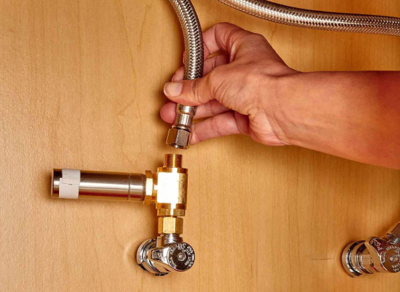
When a loud knock or thud suddenly echoes through the walls after a tap is turned off, most people are caught off guard. It happens so quickly that homeowners often have no idea what caused it.
This noise is more common than many realise, and while it can feel alarming, it usually points to a plumbing issue known as water hammer. Understanding what causes water hammer is the first step to fixing it and keeping your home comfortable and safe.
What Water Hammer Actually Is
Water hammer happens when water rushing through your pipes is suddenly forced to stop or change direction. This happens when a tap is shut off.
Some people hear it as a thud behind the wall, while others feel a quick vibration or a small jolt. The sound may vary from house to house, but the cause is pretty much the same.
If a water hammer is being ignored, it can weaken pipe joints, loosen fittings, and affect how well your appliances work. In older homes, pipes could even shake behind walls, causing long-term wear that is hard to spot.
Spotting the Signs
Before jumping into solutions, it helps to make sure the noise is actually a water hammer. Here are signs to look for:
A loud knock right after turning off a tap or appliance
Pipes shaking behind walls or floors
Washing machines or dishwashers are triggering the noise
A slight jolt when valves close
No visible leaks, but plumbing feels unstable
If you are experiencing any of these, a water hammer is likely the cause.
Common Misconceptions About Water Hammer
Only old homes experience water hammer
It will go away on its own
It means the plumbing is failing completely
In reality, even new homes can experience water hammer because the issue is more about water pressure and flow, not the age of the property.
What Causes Water Hammer
Valves that close too quickly
Many modern appliances close their water inlet valves instantly. This quick stop in water flow allows pressure to build rapidly, sending a shock wave through the pipes.
Water pressure that is too high
High pressure gives water more force. When the flow is suddenly stopped, the impact becomes stronger. Many homes do not realise their pressure is high until the noise starts.
Loose pipes
Pipes should be held firmly in place. If they move even slightly, the shockwave makes them tap against walls. This is why water hammer in some homes sounds louder than in others.
Waterlogged cushions
Older plumbing systems have small vertical pipe sections that act like cushions. Over time, these chambers can fill with water, which means the trapped air that absorbs the shock is lost, and water hammer can start to happen.
Long or complicated pipe paths
Older homes or large houses have pipes that twist, turn, and stretch across long distances. These layouts can make the shockwave travel further, so the noise becomes stronger.
Simple Solutions for Water Hammer Repairs
Homeowners can try these steps before calling a professional plumber in Melbourne.
Check the water pressure
Buy a pressure gauge and attach it to any tap. If the reading is unusually high, reducing the pressure could help.
Secure accessible pipes
If you can reach the pipes under your sink, in the laundry, or near your hot water unit, gently hold them to check if they move. If they do, use pipe clips or brackets to hold them in place so they don’t rattle.
Use the taps gently
Turning taps on and off slowly helps stop sudden pressure changes in the pipes, which can reduce water hammer.
Install Water Hammer Arrestors
These small devices help stop the banging by absorbing sudden pressure. They should be placed near the noisy spot, like the washing machine valve, to keep the pipes quieter.
Install Slow-Closing Valves
For appliances that are the main problem, replacing their standard inlet valves with slow-closing ones ensures the water flow stops gradually, preventing the shockwave entirely.
How Plumbers Diagnose the Issue
Plumbers in Melbourne follow a step-by-step approach for fixing a water hammer:
Test the water pressure at different taps
Review how appliances start and stop water
Check the type and condition of the valves
Inspect pipe sections to see if anything is loose
Listen to find where the noise starts
Consider the age and design of the home’s plumbing system
This helps the plumber find the exact cause and choose the best fix for your home, making sure the noise is sorted properly and doesn’t come back. For professional help, visit this website for more info https://neighbourhoodplumbing.com.au/.
How to Prevent Water Hammer
You can reduce the chance of water hammer happening by taking a few simple preventive steps around your home. Experts recommend:
Regular Check-ups
Scheduling routine inspections and maintenance with a trusted team of plumbers in Melbourne ensures potential pressure issues or loose pipes are detected and fixed before they escalate into loud, damaging water hammer incidents.
Professional Installations
Always ensure any new appliance or plumbing fixture installation is done by qualified Melbourne plumbers to prevent future pressure or flow problems.
Water hammer is a clear signal that your plumbing system needs attention. By understanding the causes, trying simple fixes, and knowing when to call trusted professionals, you can silence those pipes and protect your home’s plumbing system for years to come.



(0) comments
We welcome your comments
Log In
Post a comment as Guest
Keep it Clean. Please avoid obscene, vulgar, lewd, racist or sexually-oriented language.
PLEASE TURN OFF YOUR CAPS LOCK.
Don't Threaten. Threats of harming another person will not be tolerated.
Be Truthful. Don't knowingly lie about anyone or anything.
Be Nice. No racism, sexism or any sort of -ism that is degrading to another person.
Be Proactive. Use the 'Report' link on each comment to let us know of abusive posts.
Share with Us. We'd love to hear eyewitness accounts, the history behind an article.